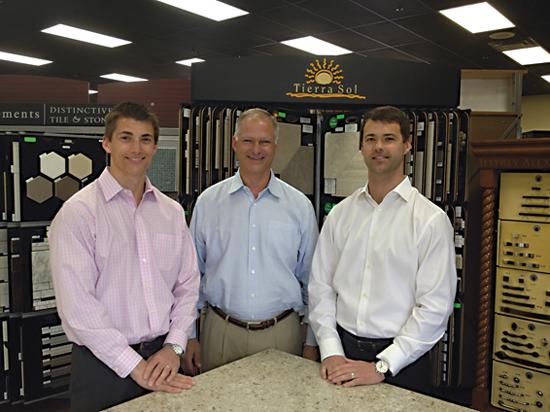Best Practices - May 2013
By Sonya Jennings
In 1981, Bill Cogdall, Sr., a builder who was frustrated by retailers offering inconsistent pricing on flooring, founded Contract Furnishings Mart (CFM). As a tradesperson, Cogdall noticed that when he was a new customer to a flooring retailer, he was given a fair price on flooring products. But as he continued to buy from a retailer, prices inevitably crept up, until the flooring products were accounting for too much of his overall building budget.
Cogdall turned his frustration into what is today a robust business for the trade that offers fair and consistent pricing to builders, designers, fire restoration companies, property managers and more. Cogdall used knowledge gleaned from his 20 years of experience in home building to establish a business that caters to the needs of tradespeople. End users shop in CFM showrooms, but all sales go through a qualified tradesperson such as a builder or designer.
In the early 1990s, Cogdall handed over the reins of the business to his son-in-law, Tim Bechtold. Along with his two sons, Matt and Ryan, Tim continues to provide tradespeople with quality products at consistent prices. The company has ten showrooms in the Portland and Seattle areas.
Since all CFM’s products are sold to the trade, the company does not install flooring; customers have their own avenues for installation. In the case that a customer needs an installer, CFM can help by recommending companies, but typically the company’s customers have installers that they work with on a regular basis.
Traditional advertising is not an effective method for CFM since the company does not sell to the end user. Instead, the company hosts special events for various industry groups. For instance, CFM hosts designer nights for local designers. Wine and cheese are served in the showroom, and innovative new products are featured and explained in detail. For an installer night, the company offers informational sessions on new techniques or products, and these sessions can count toward an installer’s continuing education credits required by the state of Oregon. These events promote CFM within the trade communities that the company targets and provide an opportunity for trade professionals to mix and mingle with store employees, so that when a flooring need arises, customers feel that they already know something about CFM and its people.
Approximately 60% of CFM’s sales are hard surface, and 40% are carpet. In the past, tile was considered too cold a product for the Northwest weather, but underfloor heating systems are being used more frequently and creating more of a demand for tile. In hardwood, wider 6” and 7” planks are trending.
While the company provides some discount products to property managers, most of the products sold at CFM are in the mid to upper price range. Many CFM customers are custom builders with clients who prefer upper end products. Ryan says that the company stays up to date on current trends by relying on the vendors to provide information on what is upcoming and popular. He also receives reliable information on trends through the company’s association with the National Floorcovering Alliance (NFA).
According to Tim Bechtold, CFM sets itself apart in the marketplace with service. “Our company is relationship driven. We know our contractor customers by name and value our relationships with them.”
The average length of employment at CFM is 15 years. Because the company has so many long-term employees, customer relationships have time to develop and grow. During the economic downturn, when other companies were cutting back on expenses, CFM continued to invest in customer relationships by hosting installer and designer nights and making a strong effort to educate its customers about new products and techniques.
Operations manager Ryan Bechtold notes, “We had confidence that the market would recover, so we used that time to strengthen our relationships and think about how to best serve our customers.” New initiatives were launched to better customer service such as improving store greetings and conducting role-playing sessions with store sales staff.
Having ten locations in the Portland and Seattle area also gives CFM a competitive edge. All ten stores have pick-up capabilities, which saves a contractor from driving around gathering five different types of tiles from five different locations. With CFM, the contractors can drive to their nearest location and take delivery of many types of flooring products from different manufacturers. According to Ryan, “This is a major logistical benefit to customers. It allows our clients to be more efficient for their clients.”
CFM salespeople are salaried employees and not paid on commission. According to Tim, “This takes away any awkward pressure in a salesperson’s relationship with a customer and allows all the focus to be on finding the right product. Also, a customer does not have to come into the store and find a particular salesperson—any salesperson can help any customer at any time.” Tim also believes that salaried salespeople are more likely to help each other and create a team environment. CFM executives try to foster a team atmosphere by not including titles on individual business cards. According to Tim, “We don’t focus on titles. Everyone in our company is empowered to help a fellow employee or a customer. There’s not a lot of ‘checking with my manager’ going on at CFM. Our employees know how to handle issues, and they do.”
CFM began as a business designed to offer builders, designers, and other tradespeople a reliable avenue for the best products at consistent prices. The company is still operating under that mission today and seeks to strengthen current relationships and begin new ones with the trade communities in Portland and Seattle.
Copyright 2013 Floor Focus
Related Topics:National Flooring Alliance (NFA), Lumber Liquidators
